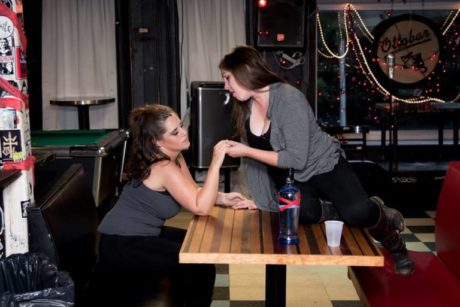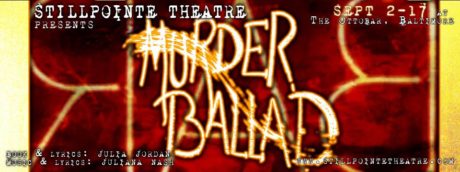In 2013, Playwright Julia Jordan and Indie rock singer/songwriter, Juliana Nash (formerly with Talking to Animals), created a ground-breaking minimalist musical about a tragic love triangle. Though the show takes place throughout Manhattan, the staging occurs among the café seats, stools, and pool tables of a downtown city bar, treating the patrons to a close-up view of love, sex, marriage, and family, with no small amount of pain, betrayal, and the bloody hand of violent retribution.
The plot centers on Sara, a free-living woman with dreams of music, who meets her husband, Michael, while on the rebound from her breakup with the equally ungrounded would-be actor, Tom. Before she can make a meaningful break from her former party life, she finds herself an uptown wife and mother of five-year-old Frankie (she is referred to as a present character though no actor fills the role).

Sara’s discontentment with her new life of private schools and business cocktails leads her into depression, and then back into Tom’s bed. The affair has all the usual effects drama tells us it should on her marriage: she withdraws from her husband, neglects her child, catalyzes a violent confrontation between her two men, etc.
Jordan and Nash’s script has a lot of fire, some interesting unconventional structure, but also some elements that limit it as fully satisfying evening of theatre. There are moments that are deeply moving. In one she is in the process of breaking with her affair, while Michael is screaming for her over the phone that Frankie is sick and no one can find her. In another, she begs Michael not to forgive her, but just to look at her as he stares disgusted at the floor.
Certainly many of the lyrics are rich and poetic, such as Michael’s use of “sugar cubes and rock salt” as a metaphor for his own suspicions. Others are brutally honest, such as when Michael suggests they go grab a drink at “your (Sara) boyfriend’s bar.” These beauties in large part make up for some repetitive sections, clichéd reads on male/female relationships, and what this reviewer considers a gratuitously contrived act of violence for the ending.

Director Corey Hennessey (who also fills the role of the narrator), and his Co-Director, Amanda J. Rife, take us upstairs of the Ottobar, and although they, along with their design team (Ryan Haase, Zoe Kanter, and Danielle Robinette) only need a few details to dress the environment for this specific show, the pool tables and a cleverly placed 1940’s radio style microphone (which is used for periodic moments of “soap-box” reflection), along with the simple, moody lighting wash, and the contrasting club wear and uptown attire, fit the show nicely. A simple effect of having Sara don a light brown sweater jacket over her clubwear to show her conflicting personality and lifestyle, for example, is a strong metaphoric design choice.
The most innovative element is a gender-bending approach to casting. Tom and Michael are played, respectively, by female performers Amber Wood and Moira Horowitz. Only Sara is cast as written, played with subtle emotional turmoil by the versatile Sarah Heiderman. Wood and Horowitz are likewise fine performers, and they create a succinct contrast for Heiderman. Wood is firey and impulsive, where Horowitz is shy and stiffly condescending, until she turns on the rage to confront Wood.
The score is in the same general style as shows like Next to Normal. Though the events are entirely sung-through, they have the texture of spoken dialogue with rhythms and musical climaxes, rather than a series of discrete songs. The live band delivers Nash’s soulful indie rock score effectively. Nick Jewett serves as musical director, while also providing guitar alongside bassist Cody Raum, keyboardist Trevor Shipley, and drummer Joe Pipkin.
There’s a special challenge making vocal scores written for men work for female voices, and although one can hear strain on some higher notes, Nash’s score is generally adaptable and Jewett’s guidance seems to help the performers handle cross-gender musical theatre casting the vast majority of the 80 minutes of music. The actors have well-trained, professional sounding voices. Hennessey’s singing in particular connects with the score, and his menacing intensity serves him well as both narrator (with “her” own secret axe to grind) and conductor of the events (at times he points his bat like a baton, “directing” his fellow cast members during the action itself).
It is ultimately this element that most recommends StillPointe’s Murder Ballad at the Ottobar. Many of the comments on men, women, sexuality, gender, marriage, and childcare become all the more topical with the disruption of stable gender roles. Though the script isn’t changed (Michael says of Tom “He sounds like an a@%hole”), the debate between motherhood and freedom, between stability and excitement, the very senses of identity which are at the core of all human action, is deepened by the fundamental questioning of those very identities.
In essence, StillPointe’s production choices improve on this provocative and very new musical’s raw human tragedy.
Running Time: 80 minutes, with no intermission.
Murder Ballad plays through September 17, 2016 at StillPointe Theatre performing at The Ottobar – 2549 North Howard Street, in Baltimore MD. For tickets, purchase them online.
RATING:





